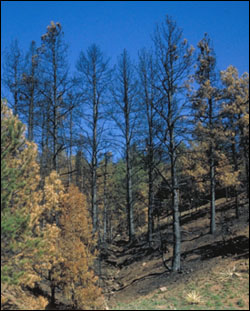March 26, 2006

Expedited logging after forest fires may harm forests, according to nearly 170 scientists responding to efforts in the U.S. Congress to pass the Forest Emergency Recovery and Research Act. The issue of salvage logging was highlighted by a forum in Washington, D.C. this month, during which the impacts of logging in a forest following fires or other natural events were discussed, including the role these events play in maintaining wildlife and “healthy” forests.
The scientists sent a letter to Congress expressing their concerns about speeding up logging and replanting activities after forest fires and natural disturbances. Logging and replanting, they argued, “may actually slow the natural recovery of forests and of streams and creatures within them.”
According to American Lands Alliance, nearly 190 million acres of federal land are at high risk for wildfire. Following the devastating forest fires in the summer of 2002, Congress passed the controversial 2003 Healthy Forests Restoration Act. The current legislation seeks to address rehabilitation after natural disasters.
Arguments against logging in forests after fires include:
- Most plants and animals have evolved with depend on and are adapted to periodic fires, according Dr. Reed Noss, professor of conservation biology for the University of Central Florida.
- Post-fire and post-disturbance logging may increase the reburn potential of a forest by concentrating flammable slash, such as small branches, near the ground, said Tania Schoennagel, fire scientist from the University of Colorado. She added that large, less-ignitable fuels such as tree trunks, which provide perching, nesting and feeding sites for wildlife, are removed by logging. “Most of this material would naturally fall to the ground, adding important supplies of nutrients and energy to the forest floor and structure in the form of woody debris to stream channels,” the letter states. “But this naturally happens over decades, not in the relatively short time associated with a logging operation.”
- A burned area may be the most ecologically sensitive place for logging, said Dr. Richard Hutto, professor and director of the Avian Science Center at the University of Montana. “We talk about forest restoration after a fire, but it just got restored by fire itself,” he said. “That’s what fire does.”
- Post-disturbance logging hinders forest regeneration when it:
- Compacts soils
- Removes or destroys soil organic material, seeds, large standing and downed trees
- Damages riparian corridors
- Introduces or spreads invasive species
- Causes erosion
- Delivers sediment to streams from logging roads and steep slopes
- Degrades water quality
- Damages aquatic life populations
Several studies were cited by the group United Forest Defense Campaign that show salvage logging in forests recovering from fires causes negative impacts on ecological recovery, or increases fire risks, including:
- Post-Wildfire Logging Hinders Regeneration and Increases Fire Risk – Daniel Donato et al.
- The effects of postfire salvage logging on aquatic ecosystems in the American West – J.R. Karr et al., 2004.
- Postfire management on forested public lands of the western United States – R.L. Beschta et al., 2004.
- Salvage harvesting policies after natural disturbance – D.B. Lindenmayer et al., 2004.
- Interior Columbia Basin Ecosystem Management Project.
- Recommendations of scientists representing the Forest Ecosystem Management Team that assembled the Northwest Forest Plan.
“By adding another stressor to burned watersheds, post-fire salvage logging worsens degraded aquatic conditions accumulated from a century of human activity,” said Karr, an aquatic and avian ecologist at University of Washington. “This additional damage impedes the recovery and restoration of aquatic systems, lowers water quality, shrinks the distribution and abundance of native aquatic species, and compromises the flow of economic benefits to human communities that depend on aquatic resources.”
The scientists also expressed economic concerns of postfire logging. According to a report cited in the letter, The facts and myths of post-fire management: a case study of the Biscuit fire, southwest Oregon (D.A. DellaSala, et. al, 2006), costs of postfire logging operations after the 2002 Biscuit fire in Oregon exceeded revenue by $14 million. Fifty-three million board feet of timber was removed.
Sources: United Forests Defense Campaign, American Lands Alliance.